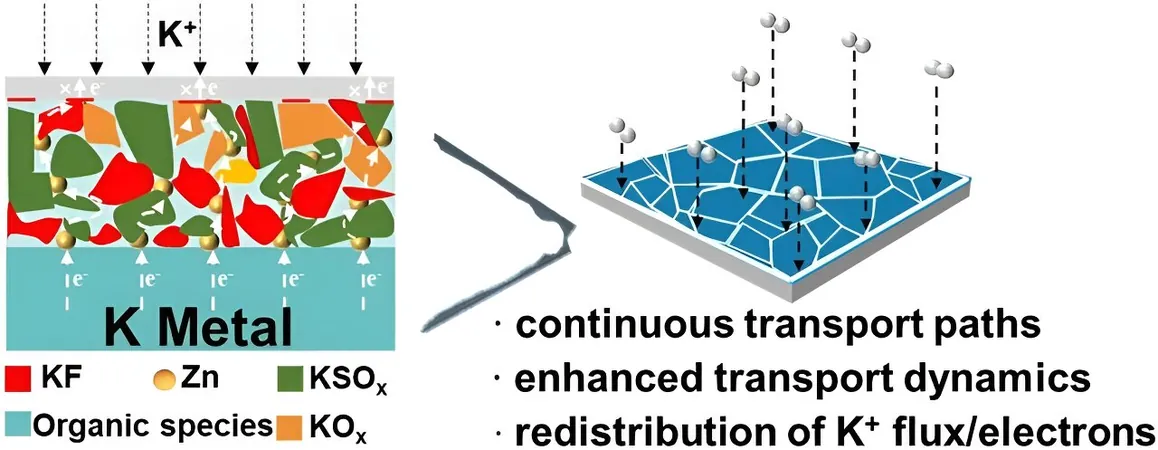
Unlocking the Future of Energy Storage: A Breakthrough with Dendrite-Free Potassium Anodes!
2024-09-18
Author: Mei
Introduction
In the quest for sustainable energy, Potassium Metal Batteries (PMBs) are emerging as a promising alternative to traditional lithium-ion batteries. With potassium being more abundant and cost-effective, researchers have turned their attention to addressing major challenges that threaten the performance of PMBs—specifically, uncontrolled dendrite growth and interfacial instability.
Groundbreaking Research
A groundbreaking study conducted by researchers at Northeastern University, recently published in the journal eScience, reveals a game-changing technique to create a dendrite-free metallic-potassium anode. Their research, titled “Realizing a Dendrite-Free Metallic-Potassium Anode Using Reactive Prewetting Chemistry,” showcases an innovative approach that could lead to safer and more efficient energy storage solutions.
Innovative Technique
The research team has developed a KF/Zn-rich hybrid interface layer on potassium metal using a unique reactive prewetting technique. This interface dramatically enhances the dynamics of ion and electron transport, allowing the anode to maintain exceptional electrochemical performance over 2,000 hours of continuous cycling. The combination of potassium fluoride (KF) and zinc (Zn) nanocrystals serves a dual purpose: while KF acts as a robust barrier to prevent dendrite formation, Zn significantly improves electrical conductivity and ion transport.
Remarkable Results
Remarkably, batteries utilizing the newly designed KF/Zn@K anode exhibited minimal voltage fluctuations and maintained dendrite-free operation over extensive testing. Notably, these batteries achieved a reversible capacity of 61.6 mAh/g at a rate of 5 C for over 3,000 cycles—an impressive milestone in the realm of energy storage.
Expert Insight
Dr. Wen-Bin Luo, the lead researcher behind the study, emphasizes that their findings provide a straightforward yet effective solution to a long-standing challenge in potassium metal battery development. “By optimizing a hybrid interface layer that regulates ion and electron flow, we not only enhance performance but also significantly improve safety.”
Implications and Future Prospects
The implications of this breakthrough are vast. With a stable, dendrite-free interface, PMBs can become a dependable choice for large-scale energy storage systems, addressing critical safety concerns and paving the way for scalable, high-performance battery designs. This revolutionary advancement has the potential to transform the renewable energy landscape, making PMBs a viable option for everything from consumer electronics to electric vehicles and grid storage solutions.
Conclusion
As the world pushes towards a more sustainable energy future, this innovative approach in energy storage technology could be a key player in revolutionizing how we harness and store renewable energy. The journey to a greener planet may well be bolstered by the advancements in potassium metal batteries, offering a glimpse into a more efficient and safer energy landscape.



 Brasil (PT)
Brasil (PT)
 Canada (EN)
Canada (EN)
 Chile (ES)
Chile (ES)
 Česko (CS)
Česko (CS)
 대한민국 (KO)
대한민국 (KO)
 España (ES)
España (ES)
 France (FR)
France (FR)
 Hong Kong (EN)
Hong Kong (EN)
 Italia (IT)
Italia (IT)
 日本 (JA)
日本 (JA)
 Magyarország (HU)
Magyarország (HU)
 Norge (NO)
Norge (NO)
 Polska (PL)
Polska (PL)
 Schweiz (DE)
Schweiz (DE)
 Singapore (EN)
Singapore (EN)
 Sverige (SV)
Sverige (SV)
 Suomi (FI)
Suomi (FI)
 Türkiye (TR)
Türkiye (TR)
 الإمارات العربية المتحدة (AR)
الإمارات العربية المتحدة (AR)